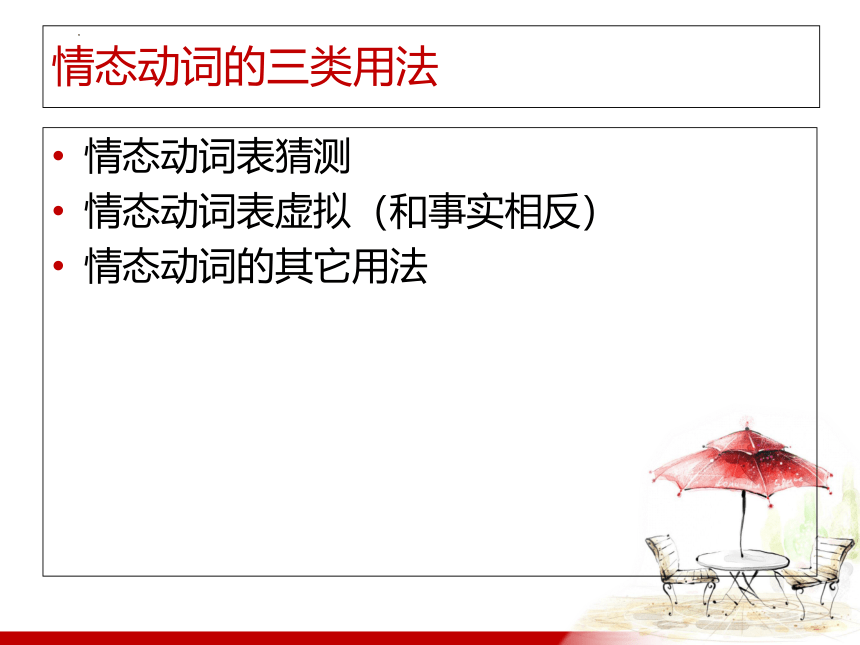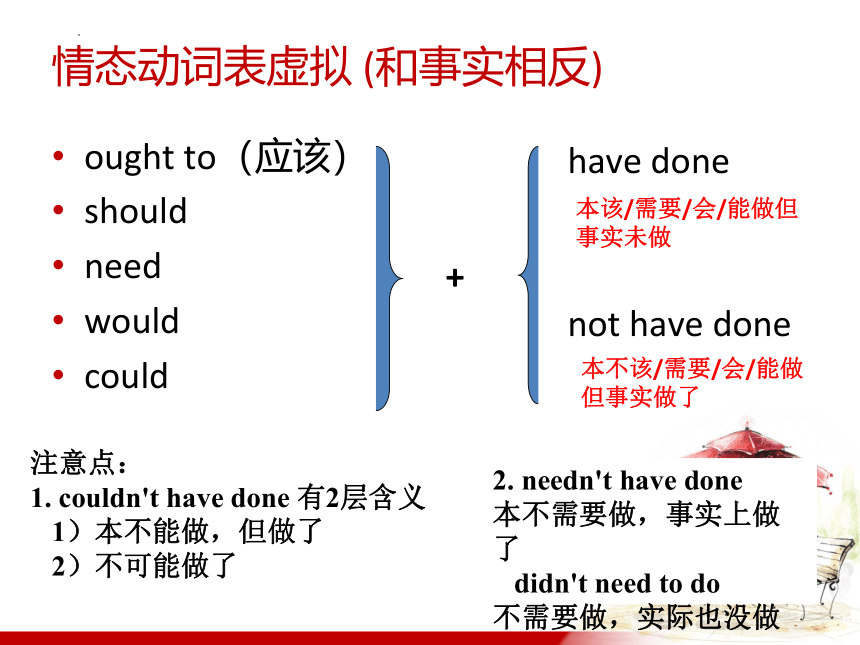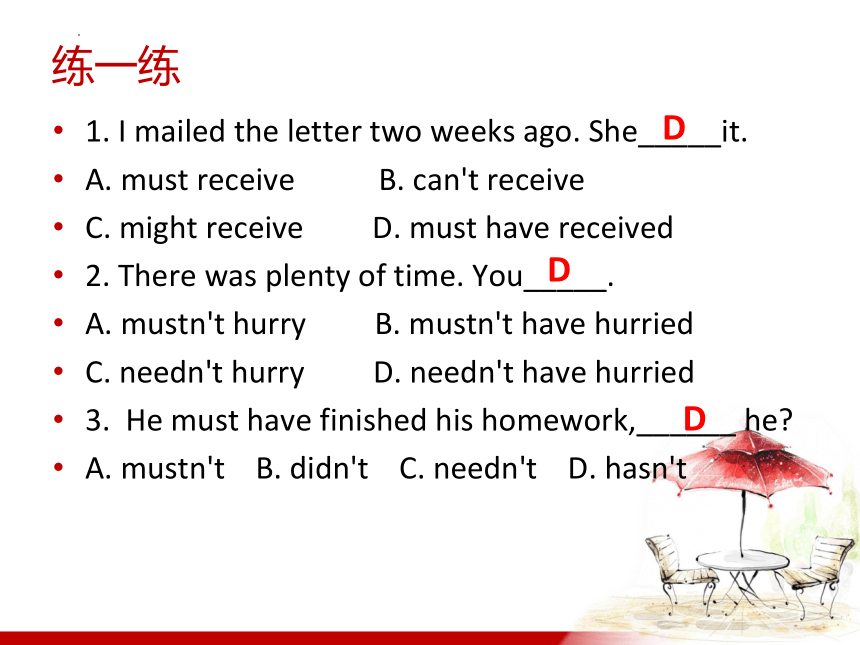2022届高考英语二轮复习:情态动词的用法课件(22张)
文档属性
| 名称 | 2022届高考英语二轮复习:情态动词的用法课件(22张) |

|
|
| 格式 | pptx | ||
| 文件大小 | 2.1MB | ||
| 资源类型 | 教案 | ||
| 版本资源 | 通用版 | ||
| 科目 | 英语 | ||
| 更新时间 | 2022-05-01 19:20:00 | ||
图片预览









文档简介
(共22张PPT)
高中情态动词
情态动词讲义
情态动词的用法
情态动词的三类用法
情态动词表猜测
情态动词表虚拟(和事实相反)
情态动词的其它用法
情态动词表猜测
must
may
might
can't
couldn't
肯定
可能
不可能
+
do/be
be doing
have done
"一般情况"猜测
“此刻正在”猜测
“过去”猜测
e.g. 1. 他肯定是一位学生。
2. 玛丽现在可能在家里做作业。
3. 他们现在肯定正等在校门口。
4. 昨晚不可能下雨了。
5. 外面肯定在下雨。
He must be a student.
Mary may/might be doing her homework at home.
They must be waiting at the school gate now.
It can't have rained last night.
It must be raining outside.
注意点:
1. must解释为“肯定”时,其否定是can't,couldn't(不可能),不是mustn't(禁止,不准)
2. 疑问句,表示“...可能吗?”“怎么可能... ”只能用“Can/Could... ”"How can/could... ",不用其他情态动词。
3. may/might not ...“可能不...”; can/could not... "不可能..."
4. couldn't have done有两层含义:1. 不可能做了(对过去推测)2. 本不能做,但做了(虚拟)
表猜测时,反义疑问句要根据时态
He must be sick, _____________
It must be raining outside, _______________
It can't have rained last night, ____________
They might be waiting at the gate, ___________
He may have been to America three times, _____________
isn't he
isn't it
did it
aren't they
hasn't he
情态动词表虚拟 (和事实相反)
ought to(应该)
should
need
would
could
+
have done
not have done
本该/需要/会/能做但事实未做
本不该/需要/会/能做但事实做了
注意点:
1. couldn't have done 有2层含义
1)本不能做,但做了
2)不可能做了
2. needn't have done
本不需要做,事实上做了
didn't need to do
不需要做,实际也没做
练一练
1. I mailed the letter two weeks ago. She_____it.
A. must receive B. can't receive
C. might receive D. must have received
2. There was plenty of time. You_____.
A. mustn't hurry B. mustn't have hurried
C. needn't hurry D. needn't have hurried
3. He must have finished his homework,______ he
A. mustn't B. didn't C. needn't D. hasn't
D
D
D
4. -- Look! Tom is too sleepy to work .
-- He ______ up watching TV.
A. mustn't have stayed B. shouldn't have stayed
C. mustn't stay D. ought not to stay.
5. Most of the students felt rather disappointed at the English party. They say that it ___ better organized.
A. had been B. had to be
C. must have been D. could have been
6. I got up early this morning, but I _______so because I had no work to do.
A. mustn't have done B. didn't need to do
C. needn't have done D. can't have done
B
D
C
7. I didn't see her in the meeting room this morning.
She_______ at the meeting.
A. mustn't have spoken B. shouldn't have spoken
C: needn't have spoken D. couldn't have spoken
8. -- ______he be watching TV now
-- Yes, he _____ be watching TV now.
-- No, he _____ be watching TV now.
A. Must, can, mustn't B. Can ,must, can't
C. Can, can, mustn't D. May, must, needn't
D
B
情态动词的其它用法
1. could
1)先天的一种能力(有能力,但不一定去做),是can的过去式;而be able to do是后天培养的能力,并表示做成功了
2)表示“允许”或“请求”(语气很委婉),这时并不是表示过去。“Could I ... "
2. may
1)表示“许可”
2)表示祈祷,愿望,翻译成“祝......”
e.g. May you succeed!祝你成功!
3. must
1) "必须",其否定形式为:
e.g. -- Must I finish the homework today
-- No, you needn't.
"肯定",其否定形式为:
2)”mustn't“解释为 "禁止” (语气比can't,couldn't强)
3)“偏要,非要”
e.g. If you must smoke, please go out.
4 ) 表示“必然性”,即自然规律或必然结果
e.g. All men must die. 人固有一死。
needn't
can't,couldn't
4. shall
1) 与第一,第三人称的疑问句搭配,表示提意见或建议
e.g. Shall I fetch a doctor for you
Shall he attend the meeting
2) 与第二,第三人称的陈述句搭配,表示说话人的允诺,警告,命令,威胁等,还可以表示法律规则等规定。
e.g. You shall be sorry for what you have done.
You shall get a book as a present if you work hard.
5. should/ought to
1) "应该"(提建议)
2)表示对已经发生的事表责备 should/ought to (not) have done "本(不)应该做,却......"
3)根据情况表推测,解释为“理应”
e.g. The report is written after careful investigation (调查),so it should/ought to be reliable (可信的).
4 ) should 还可以表示“竟然”
5)在一些句型里(表示建议)必须用should
e.g. ... suggest/advise/... that sb (should) do
6. will
1) 意愿 ,“愿意”,这时并不是将来时
e.g. If you will wait over there for a minute, Mr. Smith, I’ll tell our manager you’ve arrived.
2)表倾向性动作,解释为“总是,老是”
e.g. Oil will float on water. 油总是浮在水的表面。
3) 其否定结构还可以翻译成“不肯,不能,不愿意”
(物作主语时,是拟人手法)
e.g. The door won't open.
The machine won't work.
7. would
1) 意愿,“愿意”是will的过去时
2)表示征求意见(婉转的表达)
“Would you... ”="Could you... "
3) 表示过去常常(现在不一定还做不做)
used to 过去常常(以前做,现在一定不做了)
8. need 和dare
1) 作为情态动词时,用于否定,疑问或条件句
(此时,need无过去式,dare过去式为dared)
needn't /dare(d) not do
Need/Dare(d) ...do
If... need/dare(d) do
2)实义动词,可用于各种句型(肯定,否定,疑问,条件句)
need(s)/(ed) to do
dare(s)/(d) to do
否
don't/doesn't/didn't need to do
疑问
Do/Does/Did... need to do
疑问
Do/Does/Did... dare (to) do
否
don't/doesn't/didn't dare (to) do
练一练
1. Johnny, you______ play with the knife, you______ hurt yourself.
A. can't...may B. mustn't...may
C. shouldn't, must D. can't...shouldn't
2. John_____ his father about his failure in the exam.
A. dares not tell B. dares not telling
C. dare not tell D. dares not to tell
3. -- May I stop my car here
-- No, you____.
A. can't B. mustn't C. needn't D. don't have to
B
C
B
4. -- Must we clean the house now
-- No, you _______.
A. needn't B. may not C. mustn't D. can't
5. The fire spread through the hotel very quickly but everyone_______ get out.
A. had to B. would C. could D. was able to
6. This pen looks like mine, yet it isn't. Whose _____it be
A. must B. can C. may D. might
7. He _____ take a walk near the forest in the evening.
A. could B. might C. would D. must
A
D
B
C
Thanks For Your Listening
高中情态动词
情态动词讲义
情态动词的用法
情态动词的三类用法
情态动词表猜测
情态动词表虚拟(和事实相反)
情态动词的其它用法
情态动词表猜测
must
may
might
can't
couldn't
肯定
可能
不可能
+
do/be
be doing
have done
"一般情况"猜测
“此刻正在”猜测
“过去”猜测
e.g. 1. 他肯定是一位学生。
2. 玛丽现在可能在家里做作业。
3. 他们现在肯定正等在校门口。
4. 昨晚不可能下雨了。
5. 外面肯定在下雨。
He must be a student.
Mary may/might be doing her homework at home.
They must be waiting at the school gate now.
It can't have rained last night.
It must be raining outside.
注意点:
1. must解释为“肯定”时,其否定是can't,couldn't(不可能),不是mustn't(禁止,不准)
2. 疑问句,表示“...可能吗?”“怎么可能... ”只能用“Can/Could... ”"How can/could... ",不用其他情态动词。
3. may/might not ...“可能不...”; can/could not... "不可能..."
4. couldn't have done有两层含义:1. 不可能做了(对过去推测)2. 本不能做,但做了(虚拟)
表猜测时,反义疑问句要根据时态
He must be sick, _____________
It must be raining outside, _______________
It can't have rained last night, ____________
They might be waiting at the gate, ___________
He may have been to America three times, _____________
isn't he
isn't it
did it
aren't they
hasn't he
情态动词表虚拟 (和事实相反)
ought to(应该)
should
need
would
could
+
have done
not have done
本该/需要/会/能做但事实未做
本不该/需要/会/能做但事实做了
注意点:
1. couldn't have done 有2层含义
1)本不能做,但做了
2)不可能做了
2. needn't have done
本不需要做,事实上做了
didn't need to do
不需要做,实际也没做
练一练
1. I mailed the letter two weeks ago. She_____it.
A. must receive B. can't receive
C. might receive D. must have received
2. There was plenty of time. You_____.
A. mustn't hurry B. mustn't have hurried
C. needn't hurry D. needn't have hurried
3. He must have finished his homework,______ he
A. mustn't B. didn't C. needn't D. hasn't
D
D
D
4. -- Look! Tom is too sleepy to work .
-- He ______ up watching TV.
A. mustn't have stayed B. shouldn't have stayed
C. mustn't stay D. ought not to stay.
5. Most of the students felt rather disappointed at the English party. They say that it ___ better organized.
A. had been B. had to be
C. must have been D. could have been
6. I got up early this morning, but I _______so because I had no work to do.
A. mustn't have done B. didn't need to do
C. needn't have done D. can't have done
B
D
C
7. I didn't see her in the meeting room this morning.
She_______ at the meeting.
A. mustn't have spoken B. shouldn't have spoken
C: needn't have spoken D. couldn't have spoken
8. -- ______he be watching TV now
-- Yes, he _____ be watching TV now.
-- No, he _____ be watching TV now.
A. Must, can, mustn't B. Can ,must, can't
C. Can, can, mustn't D. May, must, needn't
D
B
情态动词的其它用法
1. could
1)先天的一种能力(有能力,但不一定去做),是can的过去式;而be able to do是后天培养的能力,并表示做成功了
2)表示“允许”或“请求”(语气很委婉),这时并不是表示过去。“Could I ... "
2. may
1)表示“许可”
2)表示祈祷,愿望,翻译成“祝......”
e.g. May you succeed!祝你成功!
3. must
1) "必须",其否定形式为:
e.g. -- Must I finish the homework today
-- No, you needn't.
"肯定",其否定形式为:
2)”mustn't“解释为 "禁止” (语气比can't,couldn't强)
3)“偏要,非要”
e.g. If you must smoke, please go out.
4 ) 表示“必然性”,即自然规律或必然结果
e.g. All men must die. 人固有一死。
needn't
can't,couldn't
4. shall
1) 与第一,第三人称的疑问句搭配,表示提意见或建议
e.g. Shall I fetch a doctor for you
Shall he attend the meeting
2) 与第二,第三人称的陈述句搭配,表示说话人的允诺,警告,命令,威胁等,还可以表示法律规则等规定。
e.g. You shall be sorry for what you have done.
You shall get a book as a present if you work hard.
5. should/ought to
1) "应该"(提建议)
2)表示对已经发生的事表责备 should/ought to (not) have done "本(不)应该做,却......"
3)根据情况表推测,解释为“理应”
e.g. The report is written after careful investigation (调查),so it should/ought to be reliable (可信的).
4 ) should 还可以表示“竟然”
5)在一些句型里(表示建议)必须用should
e.g. ... suggest/advise/... that sb (should) do
6. will
1) 意愿 ,“愿意”,这时并不是将来时
e.g. If you will wait over there for a minute, Mr. Smith, I’ll tell our manager you’ve arrived.
2)表倾向性动作,解释为“总是,老是”
e.g. Oil will float on water. 油总是浮在水的表面。
3) 其否定结构还可以翻译成“不肯,不能,不愿意”
(物作主语时,是拟人手法)
e.g. The door won't open.
The machine won't work.
7. would
1) 意愿,“愿意”是will的过去时
2)表示征求意见(婉转的表达)
“Would you... ”="Could you... "
3) 表示过去常常(现在不一定还做不做)
used to 过去常常(以前做,现在一定不做了)
8. need 和dare
1) 作为情态动词时,用于否定,疑问或条件句
(此时,need无过去式,dare过去式为dared)
needn't /dare(d) not do
Need/Dare(d) ...do
If... need/dare(d) do
2)实义动词,可用于各种句型(肯定,否定,疑问,条件句)
need(s)/(ed) to do
dare(s)/(d) to do
否
don't/doesn't/didn't need to do
疑问
Do/Does/Did... need to do
疑问
Do/Does/Did... dare (to) do
否
don't/doesn't/didn't dare (to) do
练一练
1. Johnny, you______ play with the knife, you______ hurt yourself.
A. can't...may B. mustn't...may
C. shouldn't, must D. can't...shouldn't
2. John_____ his father about his failure in the exam.
A. dares not tell B. dares not telling
C. dare not tell D. dares not to tell
3. -- May I stop my car here
-- No, you____.
A. can't B. mustn't C. needn't D. don't have to
B
C
B
4. -- Must we clean the house now
-- No, you _______.
A. needn't B. may not C. mustn't D. can't
5. The fire spread through the hotel very quickly but everyone_______ get out.
A. had to B. would C. could D. was able to
6. This pen looks like mine, yet it isn't. Whose _____it be
A. must B. can C. may D. might
7. He _____ take a walk near the forest in the evening.
A. could B. might C. would D. must
A
D
B
C
Thanks For Your Listening
